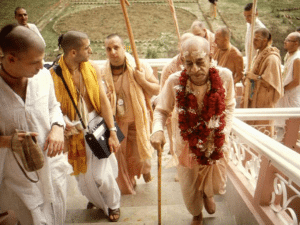'Why have you neglected this part of the temple?'
Kurma Dasa: Prabhupada entered the temple room and found it bare except for a simple wooden altar on the side wall with three-inch Jagannatha Deities and a small red velvet-covered vyasasana with its back facing towards Oxford Street. Reddish hessian cloth hung from the ceiling and walls. Devotees had placed an old rug on top of the worn carpet. The smoky haze in the air was from the down stairs kitchen where Upananda had burned the cumin seeds and chillies to spice Srila Prabhupada's dal. The small group of guests that were waiting in the temple were quickly joinedby the devotees, still chanting, as they scrambled into the shop-front. Prabhupada bowed down before Lord Jagannatha and then sat on the vyasasana. Taking out his shiny karatals, he joined in the exuberant kirtana. As he chanted, Prabhupada looked around the room at the devotees and guests alike, carefully studying each face. His intelligent gaze appeared serious and heavy.
Arthur: I was one of the half-dozen or so guests in the temple that morning. Prabhupada slowly looked around the room and finally his eyes rested on me. He looked at me with great concentration for what appeared to be a very long time. I looked into his eyes 'they appeared penetrating, yet smiling and kind' and he kept looking at me. Finally, Prabhupada looked away. It was an intense but wonderful experience, and I never forgot that glance.The kirtana drew to a close. Srila Prabhupada asked for the small harmonium,which he placed on his lap and proceeded to melodiously chant the Gurvashtakam eight prayers to the spiritual master. Some devotees accompanied him on karatals and those few who knew the verses joined in. Prabhupada spoke a few words of encouragement, but his demeanour was grave. He commented on the dirty carpet, and said it should be replaced. And why were there no flowers on the altar? He had brought Radha and Krishna Deities, he explained, and everything would have to be very clean before the devotees began their worship. In fact, he explained, the devotees would have to become brahmanas. Prabhupada paused, sniffed the air and turned to Caru. They are cooking with onions? Dipak pointed out that it was Upananda in the downstairs kitchen frying asafoetida. Then they are using too much spice, Prabhupada admonished. Upananda suddenly appeared with a metal cup of hot milk. 'Too hot', Prabhupada said, and Upananda took it away. Bali-mardana introduced Christine to Srila Prabhupada, explaining that it was she who had painted the picture of his guru-maharaja, sent to him in Tokyo some months before; and it was her paintings that now adorned the front window and walls of the temple. Prabhupada appeared very pleased. He glanced down and smiled encouragingly to Christine who sat cross-legged near his vyasasana. All talents, including those of the artist, he said, should be used to glorify Krishna. 'You should paint', he added.
Caru: The airport greeting had been chaotic, and the bump on my head didn't help. But when I got back to the temple and got a good chance to really see SrilaPrabhupada for the first time, the first thing that struck me was the over whelming feeling that Srila Prabhupada is non-different from his books. I would read a book and wonder: 'But what's the author like?' I had the idea that the author and his book were separate that an author had his literary life as well as his private life. But when I saw Srila Prabhupada, it just struck me that the person bhagavata and the book bhagavata were the same. That realisation stayed with me. Whether Prabhupada was alone in his room, or with one or two people, he was always just speaking from his books, just as he did when he was lecturing in public. This realisation inspired me to make a deep study of the philosophy of Krishna consciousness. Srila Prabhupada rose to leave. Bali-mardana asked him whether he would like to see the rest of the temple, and Prabhupada assented with a slight movement of his head. Accompanied by Bali-mardana, Prabhupada crossed to the back of the temple room. But instead of turning right to go upstairs and see the living quarters, Prabhupada chose to turn left and descend the steep staircase, past the curtained-off kitchen and the office, and head straight for the lower ground floor. Upananda glanced nervously at Dipak. They hadn't expected Srila Prabhupada to visit this part of the temple, especially since, in their fervour to get the temple ready, they had dumped all the rubbish just outside the back door.Preceding Prabhupada, Upananda grabbed a towel and started quickly walking backwards on his haunches, flicking the trail of dust and dirt aside. SrilaPrabhupada motioned with his hand not to bother. The back door swung open and there it lay: a stockpile of boards, rubbish and miscellaneous odds and ends, all in a cluttered heap in the concrete backyard. Prabhupada turned disapprovingly to Upananda. 'What is this?' he asked. 'Why have you neglected this part of the temple?' Upananda tried to explain that they had been in a hurry, but Prabhupada found his explanation unsatisfactory. He turned and walked back upstairs. From Prabhupada's stern mood, Upananda learnt a lesson: that the disciple should not be negligent, but rather clean and responsible in all circumstances. In the room behind the temple room lay a half-finished altar in pieces on the floor. The original altar had caught fire only weeks before and had almost burnt down the whole temple. Dipak had been working furiously to finish the new one for the coming Deity installation and had many hours work still left to go. Srila Prabhupada was silent; he glanced into the room, nodded and left for his apartment.
Reference: The Great Transcendental Adventure by Kurma Dasa
Recently Added
Trending Today
